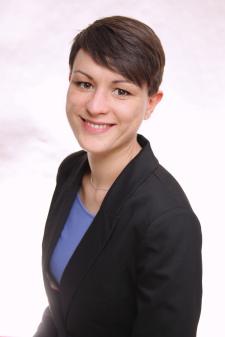Regina König
|
Alumna Position Company Graduated Faculties Degrees Date of the interview |
 |
What motivated you to study Gender and Diversity?
Prior to studying, I completed a vocational training as an occupational therapist and worked with people with different kinds of disabilities and illnesses. During this time, I witnessed some of the problems people with disabilities face, such as discrimination and severe restrictions to autonomous decision-making and societal participation. That was when I started to wonder why our society works this way and what could be done about changing it for the better. I also have considered myself a feminist since my early 20’s and was specifically interested in the ideas of Queer Feminism. Thus, when I learned in 2011 that Rhine-Waal University would offer a Bachelor’s programme in Gender and Diversity studies starting in 2012 I made my decision to apply for it to learn more about the aforementioned issues and to get to know people with whom I could discuss these questions.
Based on your own experiences, what is your advice for current and prospective Gender and Diversity students? Would you recommend studying Gender and Diversity and if so, why?
Graduates of this programme have broad perspectives and ideas about social inequality and the positive potential of diversity in a range of fields like politics, private and public businesses and education. In addition, G&D students are thoroughly trained in research methods and have well developed critical and analytical thinking skills. That is, the programme offers a broad range of qualifications not leading to a specific occupational profile. My former co-students and I often wondered which employment prospects we would have after completion of our studies. However, I have since learned that in today’s increasingly diverse societies, gender and diversity competencies are needed in every modern societal and business institution. That is, with a degree in Gender and Diversity studies you could work in business consulting, policy advice, PR, market research, marketing, HR management, social research etc.
I can highly recommend the programme to everyone interested in Gender and Diversity issues and I would advise prospective students to apply for the programme even when they are not sure about their future career. My advice for current students is to focus on the topics they are really interested in, to make use of the possibility to visit courses and work with students in other study programmes and to get as knowledgeable as they can in the fields which are of genuine interest to them. Make this your priority. As a determined and authentic expert in your field, you will have plenty of job opportunities and a fulfilling career.
After successfully completing your bachelor’s degree, you continued with a master’s in International Management and Psychology. Can you tell us more about the transition process from one faculty to another?
As far as I know, I was the first student to transition from the G&D programme to the IMP programme and there were actually some difficulties because it was not clear whether G&D graduates fulfil the requirements. However, my request was supported by a very kind professor teaching in the G&D programme and the head of the IMP programme answered the request within a few weeks stating that G&D students fulfil the entry requirements. With the help of this statement, I was then able to apply and eventually were accepted. Moreover, I was not required to complete a “learning agreement”, i.e. I could study the regular programme without having to worry about additional requirements missing from my bachelor’s studies. Looking back, I can say that I was well prepared for the master’s programme and managed to graduate with a very good GPA.
After completing your master's, you started working at the University of Duisburg-Essen as a research assistant. Please tell us more about your current field of research.
The professorial chair I worked at deals with questions relating to children’s and adolescents’ learning disorders and difficulties regarding academic achievement. While my professor is an expert on learning disorders and neurosciences, I am interested in social determinants of individual achievement and achievement related self-concepts. For instance, I am very interested in the phenomena of self-stereotyping and stereotype threat and how they impact the achievement motivation of students. A research project we worked on deals with feelings of control over academic achievement outcomes which we found to be lower in minority students. Since perceived control over academic outcomes is an important predictor for academic achievement, the results of this study have important practical implications. That is, our future goal will be to identify causes for low academic control and means suitable to enhance feelings of academic control and thus achievement.
If you had to describe the people you met at Rhine-Waal University of Applied Sciences in three words, these would be…
Open-minded, curious, inspiring.
